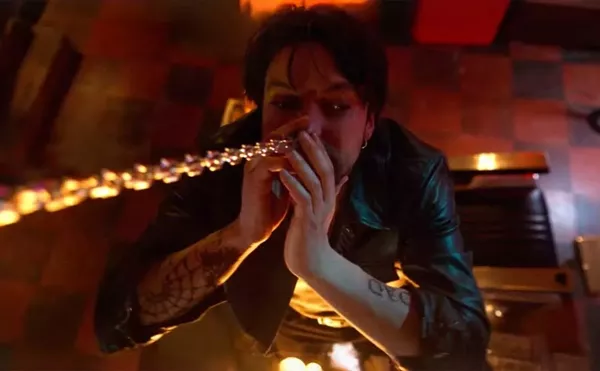Precious: Based on the Novel Push by Sapphire
A must-see film of empathy for the tragic human condition

Audio By Carbonatix
[
{
"name": "GPT - Leaderboard - Inline - Content",
"component": "35519556",
"insertPoint": "5th",
"startingPoint": "3",
"requiredCountToDisplay": "3",
"maxInsertions": 100,
"adList": [
{
"adPreset": "LeaderboardInline"
}
]
}
]
Miracles simply cannot happen in reality, and if you’d told me months ago that a movie executive-produced by Oprah and Tyler Perry, starring Mariah Carey, Lenny, Kravitz, and rowdy plus-size comedienne Mo’Nique, would be one of the year’s best films, it would have required a level of faith that I frankly lack. Get ready to believe. Precious is remarkable, one of the most effecting, personal and dazzling cinematic surprises in ages, and it came seemingly out of nowhere.
Newcomer Gabourey Sidibe brilliantly plays Clarice "Precious" Jones, a morbidly obese, illiterate, poverty-riddled 14-year-old, in 1987 Harlem, pregnant with her second incestuous child.
In an award-worthy performance, Mo’Nique plays mom, a foul, hateful creature who calls her daughter a "worthless fat bitch" whose only value is as a monthly government check. Continually abused at home, Precious can’t begin to fathom her schoolwork; she daydreams about having a handsome "light-skinned boyfriend" who’ll buy her fancy things and treat her right. These illusions are all she has in a ruined urban wasteland untouched by light or hope.
The only thing keeping her from disappearing altogether are a string of compassionate ladies, including a teacher who gets her into an alternative high school program, and a deglamorized Mariah Carey as the social worker who forces her to confront her mother. Slowly we begin to see Precious blossom, to begin not just dreaming of a better life but trying to grab it.
Precious is unflinching in portraying a blighted big-city nightmare. At times it’s so vividly brutal and grotesque that it seems like the vilest Regan administration propaganda about welfare queens.
True enough, it may seem difficult to defend the racial sensitivity of a film that shows its heroine shoplifting a bucket of fried chicken, but Precious is about seeing beyond surfaces. I also think it’s intended as a fairy tale, about a princess convinced she’s a toad, until a trio of fairy godmothers helps save her.
The film seems ready to tumble into hokum at any moment, and indeed, when the rapturous, white-robbed gospel choir fires up, you may think it’s an elaborate parody. But that scene works, as do the handful of other fantasy digressions, because Lee Daniels visualizes them with such energy, imagination and control. Like its heroine, the film exceeds all expectations, avoiding myriad pitfalls common to such inspirational storytelling.





